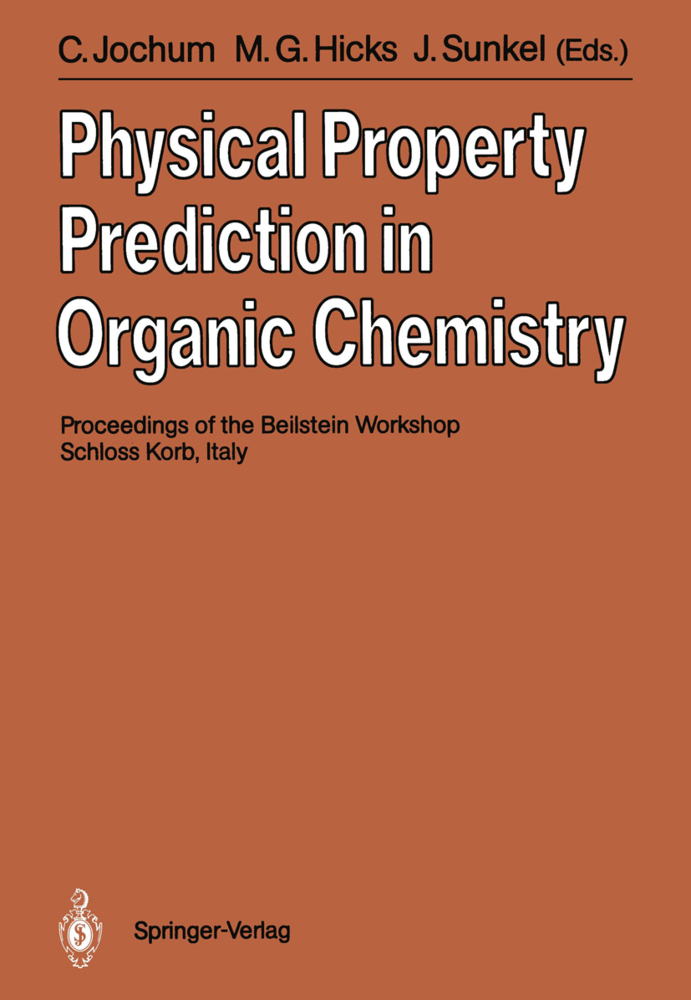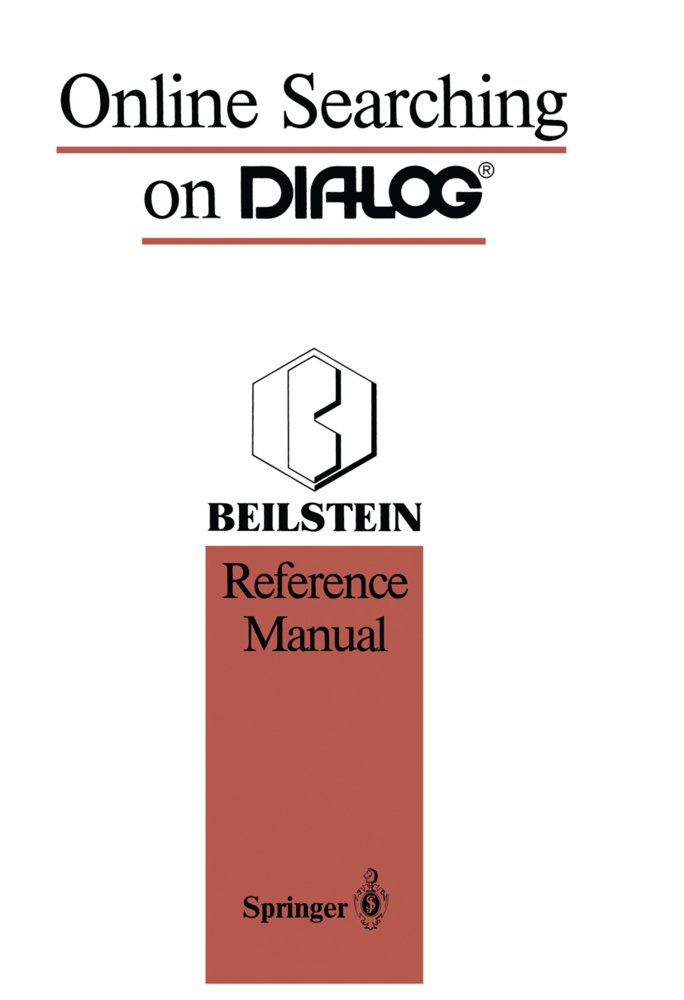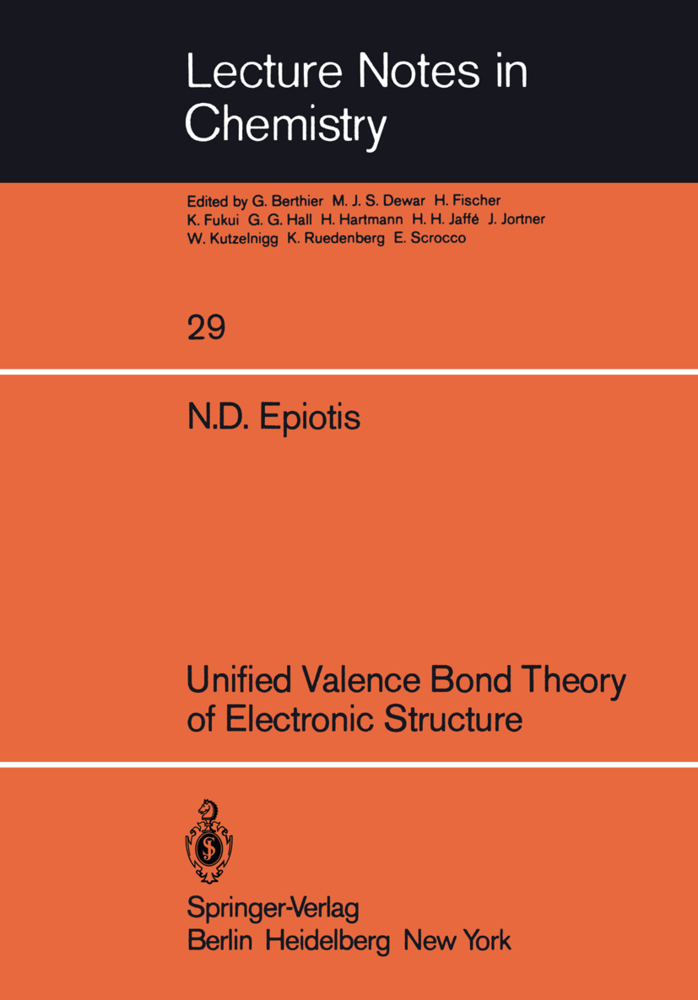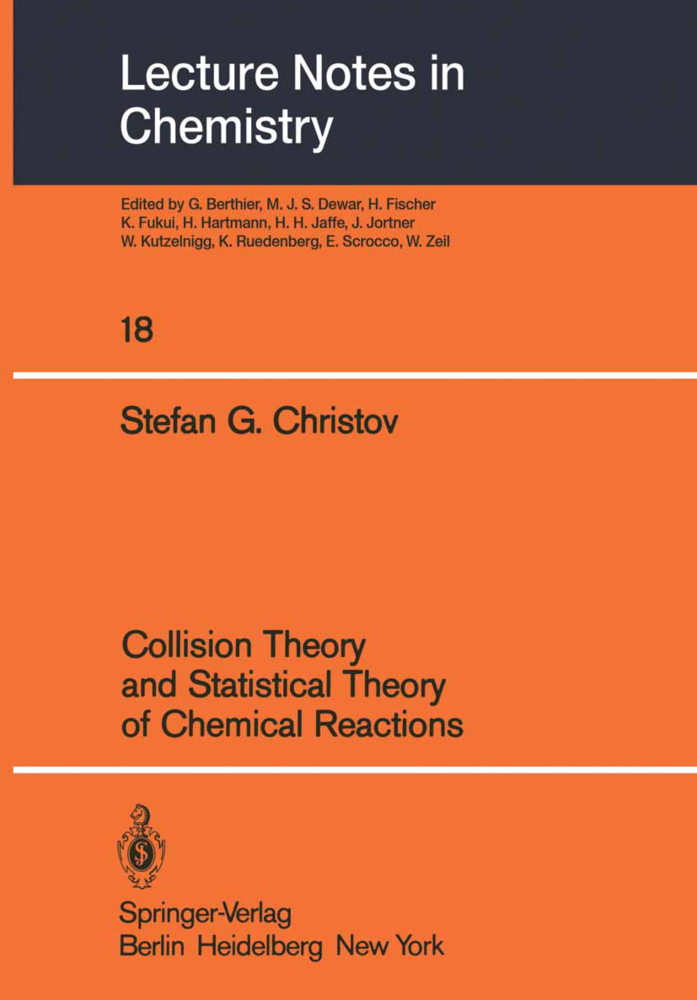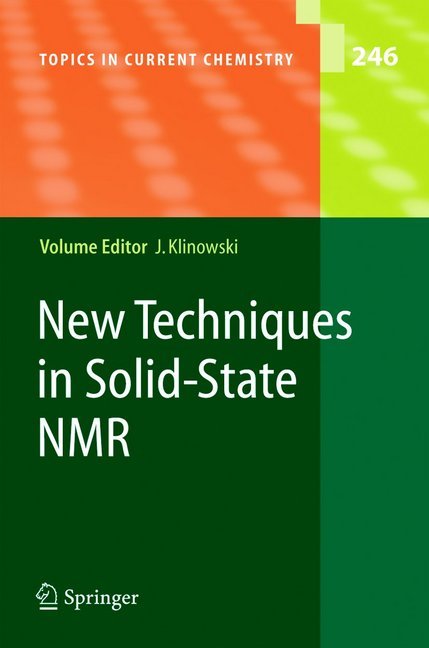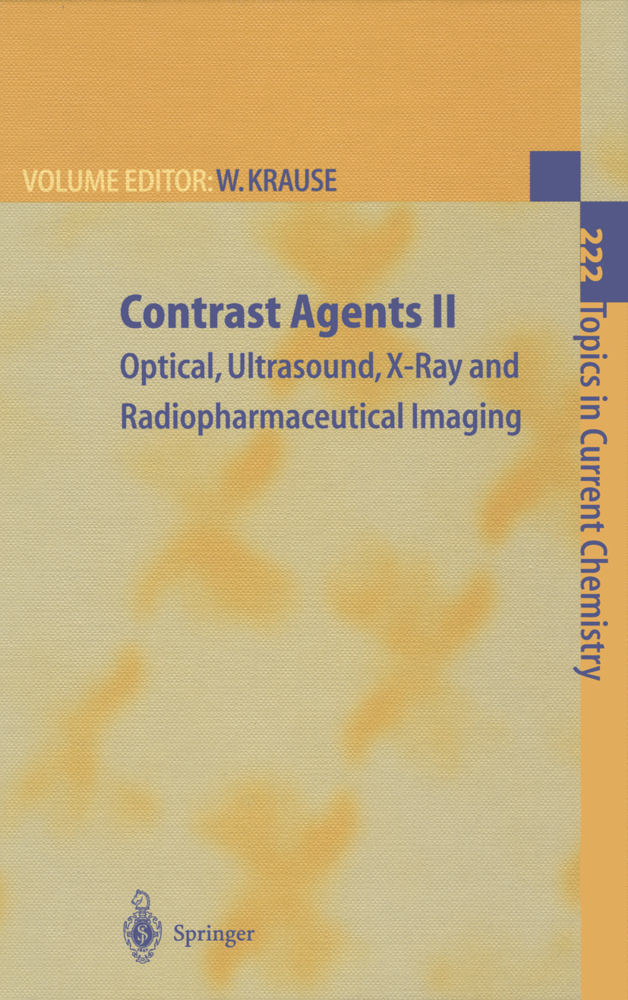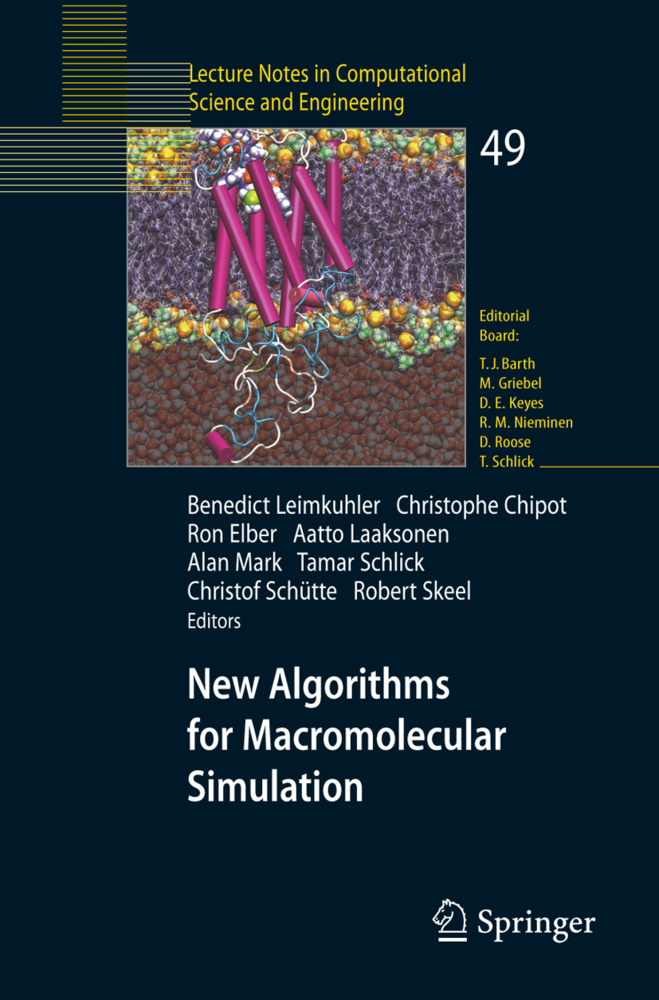Physical Property Prediction in Organic Chemistry
Proceedings of the Beilstein Workshop, 16-20th May, 1988, Schloss Korb, Italy
Physical Property Prediction in Organic Chemistry
Proceedings of the Beilstein Workshop, 16-20th May, 1988, Schloss Korb, Italy
For more than 100 years the Beilstein Handbook has been publishing checked and evaluated data on organic compounds. It has become the major reference book for the chemical and physical properties of organic com pounds. The prediction of these physical properties was the subject of the Beilstein workshop. The ability to predict physical properties is for several reasons of great interest to the Beilstein Institute. It is of primary importance to be able to check the abstracted data for accuracy and to eliminate simple mistakes like typing errors. Presently all the work whether manuscript writing or evaluation of data is carried out manually. This is very time consuming, with the entry of Beilstein into electronic data gathering and publication, the opportunity for computerized consistency checking has become available. Contrary to belief, when one examines the Beilstein Handbook or Chemical Abstracts there is a dearth of chemical information. There are a great many compounds but few are well defined resulting in large gaps in the information available to the chemist. These information gaps could be filled by using algorithmic methods to estimate the properties of interest. An important question to answer is "What is the chemist's reaction to estimated data?" Will he accept it for use, within limits defined by the method, or will it be unacceptable and therefore detrimental for the data base. However if one could partly fill gaps in the data base the increase in the power of the search techniques would be marked.
Data About Data
Questions and Issues About the Process of Estimating Properties of Chemicals
Numeric Features of the Beilstein Database on STN
The Thermodynamics Research Center Databases on Original Measurements and Evaluated Data
Computer-Aided Selection of Chemicals for Biological Testing: Estimation of Biological Activity
Physico-Chemical Property Data Bank of the Prague Institute of Chemical Technology
Molecular Orbital and Force-Field Calculations for Structure and Energy Predictions
Estimation of Thermodynamic Properties of Organic Compounds in the Gas, Liquid, and Solid Phases at 298.15 K
Empirical Methods for the Calculation of Physicochemical Data of Organic Compounds
Statistical Thermodynamics: Current Perspectives and Limitations of Fluid Property Estimation
One and Multidimensional Numerical Interpolation Methods
A Fuzzy Approach to Predicting Chemical Data from Incomplete, Uncertain and Verbal Compound Features
Ranking and Clustering of Chemical Structure Databases
Prediction of Physicochemical Properties of Organic Compounds from Molecular Structure
Current Problems in Quantitative Structure Activity Relationships
Computation of Volumes and Surface Areas of Organic Compounds
Total System of Molecular Design
Physico-chemical Data Estimation for Environmental Chemicals
Application of Molecular Topology for the Estimation of Physical Data for Environmental Chemicals
Industrial Use of Group Contribution Methods for Estimation of Physical Properties
Experience with the Development of a Group-Contribution Equation of State for the Prediction of Physical Properties forProcess Engineering Purposes
Prediction of Mixture Properties Using UNIFAC
Computer Analysis of Thermochemical Data of Organic Compounds
Prediction of Physicochemical Properties Using a Semi-Empirical Group Contribution Approach
Estimation of the Aqueous Solubility of Organic Compounds
Recommended gE-Model Parameters by Simultaneous Fitting of Different Excess Properties
The Arizona Database: An Aqueous Solubility Database for Nonelectrolytes
Correlation and Extrapolation in Chemical Engineering of Vapour Pressure Data Using Thermal Data
Establishing Consistent Thermodynamic Data on Vaporization Equilibria for Organic Compounds
Critical Compilation of Heat Capacities of Liquids
PETRA: Software Package for the Calculation of Electronic and Thermochemical Properties of Organic Molecules
Workshop Review and Epilogue.
Chemical Information - Promotion of Innovation in Science and Technology
The Importance of Data Estimation for the Beilstein Information SystemData About Data
Questions and Issues About the Process of Estimating Properties of Chemicals
Numeric Features of the Beilstein Database on STN
The Thermodynamics Research Center Databases on Original Measurements and Evaluated Data
Computer-Aided Selection of Chemicals for Biological Testing: Estimation of Biological Activity
Physico-Chemical Property Data Bank of the Prague Institute of Chemical Technology
Molecular Orbital and Force-Field Calculations for Structure and Energy Predictions
Estimation of Thermodynamic Properties of Organic Compounds in the Gas, Liquid, and Solid Phases at 298.15 K
Empirical Methods for the Calculation of Physicochemical Data of Organic Compounds
Statistical Thermodynamics: Current Perspectives and Limitations of Fluid Property Estimation
One and Multidimensional Numerical Interpolation Methods
A Fuzzy Approach to Predicting Chemical Data from Incomplete, Uncertain and Verbal Compound Features
Ranking and Clustering of Chemical Structure Databases
Prediction of Physicochemical Properties of Organic Compounds from Molecular Structure
Current Problems in Quantitative Structure Activity Relationships
Computation of Volumes and Surface Areas of Organic Compounds
Total System of Molecular Design
Physico-chemical Data Estimation for Environmental Chemicals
Application of Molecular Topology for the Estimation of Physical Data for Environmental Chemicals
Industrial Use of Group Contribution Methods for Estimation of Physical Properties
Experience with the Development of a Group-Contribution Equation of State for the Prediction of Physical Properties forProcess Engineering Purposes
Prediction of Mixture Properties Using UNIFAC
Computer Analysis of Thermochemical Data of Organic Compounds
Prediction of Physicochemical Properties Using a Semi-Empirical Group Contribution Approach
Estimation of the Aqueous Solubility of Organic Compounds
Recommended gE-Model Parameters by Simultaneous Fitting of Different Excess Properties
The Arizona Database: An Aqueous Solubility Database for Nonelectrolytes
Correlation and Extrapolation in Chemical Engineering of Vapour Pressure Data Using Thermal Data
Establishing Consistent Thermodynamic Data on Vaporization Equilibria for Organic Compounds
Critical Compilation of Heat Capacities of Liquids
PETRA: Software Package for the Calculation of Electronic and Thermochemical Properties of Organic Molecules
Workshop Review and Epilogue.
Jochum, Clemens
Hicks, Martin
Sunkel, Josef
| ISBN | 978-3-642-74142-5 |
|---|---|
| Medientyp | Buch |
| Copyrightjahr | 2012 |
| Verlag | Springer, Berlin |
| Umfang | X, 554 Seiten |
| Sprache | Englisch |

